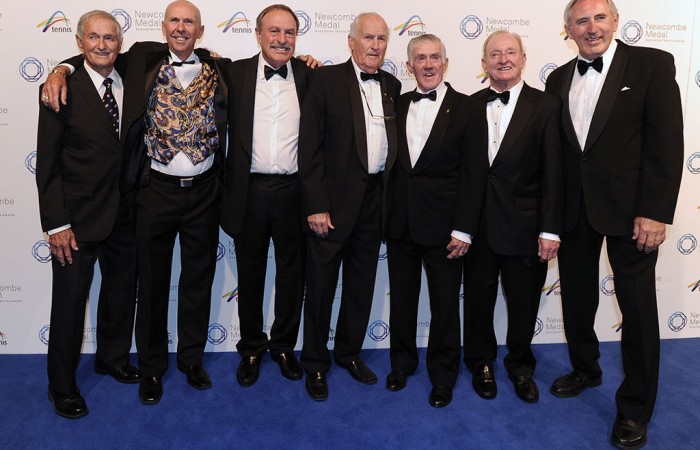Legendary Aussie Davis Cup team honoured in moving tribute
The star-studded champion Australian 1973 Davis Cup were tonight honoured for their exploits in a special presentation at the Newcombe Medal.
The star-studded champion Australian 1973 Davis Cup were tonight honoured for their exploits in a special presentation at the Newcombe Medal.
Melbourne, Australia, 2 December 2013 | Matt Trollope

Forty years ago to this day, a star-studded Australian team routed the United States and returned the Davis Cup to our shores for the first time in six years.
And tonight, those team members – John Newcombe, Rod Laver, Ken Rosewall, Mal Anderson, Geoff Masters, Colin Dibley and captain Neale Fraser – were honoured for their exploits in a special presentation at the glittering Newcombe Medal awards night.
A mini-documentary featuring interviews with Newcombe, Fraser, Laver and Rosewall helped set a poignant tone of reflection and respect in the Crown Palladium Ballroom, and a standing ovation followed among the guests in attendance when the seven champions were introduced to the stage. Former Davis Cupper Peter Luczak then recreated the Davis Cup spirit in the room when he recited the classic Australian poem “Green & Gold Malaria” by Rupert McCall.
It was a significant year in 1973; professionals were permitted to join their amateur counterparts in the team competition. Reunited, the Aussie squad of Newcombe, Laver, Rosewall and Anderson which travelled to Cleveland, Ohio for the final against their American arch-rivals was what respected tennis commentator Bud Collins described as “perhaps the strongest team ever”.
“I read a lot about recruiting people in various sports,” Fraser said.
“But I think I probably, along with Wayne Reid, our president at the time, recruited three of the greatest sportspeople of all time (Newcombe, Laver and Rosewall) to play for Australia. I felt once I had those three, boy, I was on a hiding to nothing if we didn’t win.”
Australia was attempting to wrest the cup away from a nation which had held it for five straight years. Playing on indoor carpet before a parochial American crowd against a team led by the impressive Stan Smith – who had recently topped the rankings – was going to be a tough ask.
Yet Newcombe, at the peak of his powers, accounted for Smith in a five-set thriller, a result he would describe as his finest performance. Laver then gave the visitors a 2-0 lead, improving as the match wore on to defeat Tom Gorman 8-10 8-6 6-8 6-3 6-1. When Newcombe and Laver the next day combined to inflict a dominant 6-1 6-2 6-4 win over Smith and Erik Van Dillen, the cup had returned to Australian hands. The pair then iced a 5-0 victory with wins in the reverse singles.
“They (the Americans) were the ones we were after, they’d been dominating the cup for five years,” Newcombe reflected.
“We felt at that stage we had probably one of the greatest Davis Cup teams of all time. We went with a quest to kill the Americans, and we killed them, five-zip, and I couldn’t have been happier!”
Sports Illustrated’s Jerry Kirshenbaum reported that then-Prime Minister Gough Whitlam had sent a telegram to captain Neale Fraser prior to Australia’s 4-1 semifinal rout of Czechoslovakia on grass at Kooyong. “Please inform our prodigal stars it’s time for the Davis Cup to return to its rightful place,” it said. “We won’t be satisfied with anything but 100% Australian equity.”
And that legendary Australian team of 1973 had ensured exactly that against the United States, making both their leader, and country, proud.
The victory was certainly an inspiration to sports fans and emerging tennis players all over Australia.
This included John Fitzgerald, who joined the champion team on stage to present each member with a commemorative framed print of the famous victory. Fitzgerald recalled watching every point of the final on his black-and-white television as a 12-year-old, and how this inspired him to want to pursue tennis.
These were sentiments echoed by Masters following the presentation.
“For these guys (Newcombe, Laver and Rosewall) to come back and play when they did … how could you not embrace these players?” he said
“I think them coming back in ‘73 was so instrumental in giving kudos back to Davis Cup … I don’t think it should be underestimated how important that time was.”
